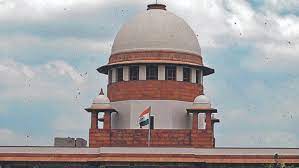Has been convicted under Sections 302 and 498A of the Indian Penal Code[“IPC”, for short] by both the courts below and has been sentenced to life imprisonment (Para 1)
The FIR No.621/2010 dated 26.09.2010 was initially registered under Section 307 IPC wherein it has been stated that the deceased wife, due to unbearable mental and physical harassment caused to her by the appellant, poured kerosene upon herself to deter the appellant from causing further torture to her and that the appellant with the clear intention to kill her took advantage of the situation and lighted the matchstick and threw it on her body uttering “You Die”. Thus, the deceased wife was inflicted with burn injuries at their residence by the appellant with clear intention of killing her. Subsequently, when the deceased wife died in the hospital, the case was converted into that under Sections 302 and 498A of IPC. (Para 3)
The defence so set up by the appellant was not accepted by either of the courts below in view of the overwhelming evidence on record regarding their frequent quarrel and the harassment meted out to the deceased wife. The ocular evidence of the witnesses clearly proved that on the date of the incident, there was again a quarrel between both of them though on a petty matter but the deceased wife, in order to avoid torture at the hands of the appellant and to deter him, went inside the kitchen and poured kerosene on herself. Thereafter, the appellant took advantage of the situation and set her on fire (Para 7)
It is on the strength of the above exception that from the side of the appellant it has been argued that the appellant is not guilty of murder as he had no premeditated mind and that the action of the appellant arose out of a sudden fight. In the first place, the fight was not sudden. The appellant and the deceased wife had a past history of quarrel and that they had been quarrelling on the fateful day also since before the actual incident. During their quarrel, a neighbour/(Sahajan) i.e. PW1 had visited their house and the deceased wife had shown some injuries received by her during the assault. However, realizing the quarrel between the two, he left saying that he would come later on. It was thereafter that the incident of pouring kerosene and burning took place. So, there was sufficient time in between the two acts and it cannot be said that there was a sudden quarrel and provocation leading to burning. The appellant saw the deceased wife drenched in kerosene and was conscious that if lighted, she would be burnt to death even then ignited her to fire. This shows premeditated mind to kill her. More particularly, the appellant cannot take advantage of the 4th Exception only on the pretext that it was not on account of premeditated mind or out of a sudden fight or that his intentions were not bad as he tried his best to douse the fire and to save the life of the deceased wife for the reason that the benefit of the above exception would have been available to him, had he not taken undue advantage of the situation (Para 20)
The aforesaid evidence clinches the issue and establishes beyond doubt that the appellant is guilty of the offence of culpable homicide amounting to murder and is not entitled to benefit of the Exception 4 to Section 300 IPC. (Para 24)
SUPREME COURT OF INDIA
2023 STPL(Web) 398 SC
[2023 INSC 965]
Anil Kumar Vs. The State Of Kerala
Criminal Appeal No.2697 Of 2023-Decided On 01-11-2023.
https://stpllaw.in/wp-content/uploads/2023/11/2023-STPLWeb-398-SC.pdf







